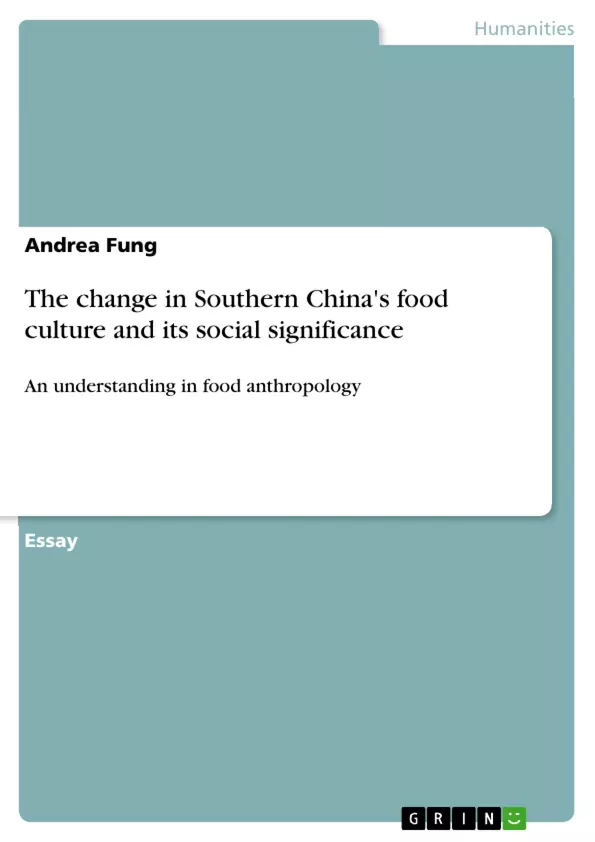It is not easy to write about the development of Food Anthropology over the past half century and its contribution to the understanding of human society and culture around the world. Yet, it is honoured to have Ellen Messer (1984), Jon D. Holtzman (2006) and Lynne Phillips (2006) published articles in the Annual Review of Anthropology. With the themes of diets, food and eating, globalization and memory, they concisely reviewed the development and significance of food anthropology at different times and its importance of interpreting social culture, as well as explored the mutual relationship between global and regional food culture. The development of food culture spans hundreds of years and spreads around the world, expanding our horizons and repositioning the problem of global integration. In view of this for the review of Food Anthropology, this proposal will only introduce some of the more representative theories and situation after the Second World War. In addition, food culture in Hong Kong’s community will be used as a case study, in order to provide an understanding of the food culture change in Southern China and its social significance.
Inhaltsverzeichnis (Table of Contents)
- Introduction
- From local traditional food to the phenomenon of globalisation.
- Case Study - Hong Kong
- Explore the social culture of food safety.
- Reference list
Zielsetzung und Themenschwerpunkte (Objectives and Key Themes)
This research essay aims to provide an understanding of the evolution of food anthropology and its significance in interpreting social culture, focusing specifically on the transformation of food culture in Southern China. By examining the impact of globalization and exploring the social significance of food in Hong Kong as a case study, the essay seeks to shed light on the complex interplay between global integration and local adaptation in food practices.
- The development of food anthropology and its contribution to understanding human society and culture
- The impact of globalization on food culture, particularly in Southern China
- The social significance of food in Hong Kong, with a focus on food safety
- The relationship between food culture and national and cultural identity
- The intersection of food, social status, and symbolic meanings
Zusammenfassung der Kapitel (Chapter Summaries)
- Introduction: This chapter provides an overview of the development of food anthropology, highlighting key figures and themes. It discusses the importance of understanding food as a symbol and its role in interpreting social culture. The chapter also introduces the case study of Hong Kong and its relevance to the broader context of food culture change in Southern China.
- From local traditional food to the phenomenon of globalisation.: This chapter delves into the impact of globalization on food culture, exploring the shift from local traditional food to the adoption of international cuisines. It examines how global forces influence dietary habits and shape the consumption patterns of different communities.
- Case Study - Hong Kong: This chapter provides a detailed analysis of food culture in Hong Kong, focusing on the social significance of food safety. It explores the cultural beliefs and practices surrounding food consumption and how they reflect social values and concerns.
Schlüsselwörter (Keywords)
This research focuses on food anthropology, globalization, food culture, social significance, Southern China, Hong Kong, food safety, cultural identity, and symbolic meanings. The essay explores how these concepts intersect and shape the understanding of food practices in a rapidly changing world.
Frequently Asked Questions
How has globalization changed food culture in Southern China?
Globalization has introduced international cuisines and modern eating habits, leading to a shift from purely traditional diets to a more globalized food landscape.
What is the focus of Food Anthropology?
It explores how diets, eating habits, and food safety reflect social structures, cultural identity, and collective memory.
Why is Hong Kong used as a case study for food culture?
Hong Kong represents a unique intersection of Southern Chinese traditions and global influences, making it ideal to study food safety and cultural adaptation.
How does food relate to national identity?
Food serves as a powerful symbol of heritage; changes in food practices often reflect broader shifts in national and cultural self-perception.
What is the social significance of food safety in Hong Kong?
Food safety concerns reflect social anxieties and trust in institutions, playing a major role in the community's daily life and social culture.
- Quote paper
- Andrea Fung (Author), 2017, The change in Southern China's food culture and its social significance, Munich, GRIN Verlag, https://www.grin.com/document/374753



